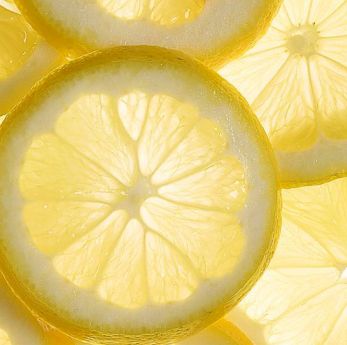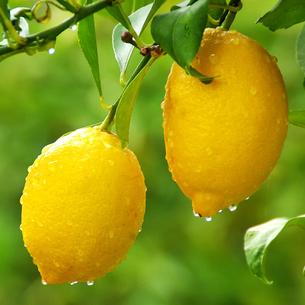-Essential-Oil.png)
-Essential-Oil.png)



Botanical name Citrus limon (L) Burm
Family Rutaceae
Source Fruit peel
Origin Argentina
Processing Method Steam Distillation
Color/Consistency A thin, colorless to greenish yellow liquid.
Aromatic Summary / Note / Strength of Aroma A top note with a strong aroma, it has a strong bright lemony scent.
Blends With Bergamot, Lime, Mandarin and Orange.
Product Abstract
The health benefits of lemon are due to its many nourishing elements like vitamin C, vitamin B6, vitamin A, vitamin E, folate, niacin, thiamin, riboflavin, pantothenic acid, copper, calcium, iron, magnesium, potassium, zinc, phosphorus, and protein. It is a fruit that contains flavonoids, which are composites that contain antioxidant and cancer-fighting properties. It helps to prevent diabetes, constipation, high blood pressure, fever, indigestion, as well as improves the skin, hair, and teeth. Studies conducted at the American Urological Association highlight the fact that lemonade or lemon juice can eliminate the occurrence of kidney stones by forming urinary citrate, which prevents the formation of crystals.
History
The origin of the lemon is unknown, though lemons are thought to have first grown in Assam (a region in northeast India), northern Burma or China. A study of the genetic origin of the lemon reported it to be hybrid between bitter orange (sour orange) and citron.
Lemons entered Europe near southern Italy no later than the second century AD, during the time of Ancient Rome. However, they were not widely cultivated. They were later introduced to Persia and then to Iraq and Egypt around 700 AD. The lemon was first recorded in literature in a 10th-century Arabic treatise on farming, and was also used as an ornamental plant in early Islamic gardens. It was distributed widely throughout the Arab world and the Mediterranean region between 1000 and 1150.
Harvesting/Extraction Information
Lemons are ready to pick as soon as they are yellow or yellow green in appearance and firm. The fruit will be 2 to 3 inches in size. It’s better to wait until they are the right size and not worry so much about color than to wait for them to be completely yellow.
The thing that differentiates cold pressed Lemon from steam distilled Lemon is that steam distilled Lemon is not phototoxic. Therefore it can be used in body care products such as lotions and lip balms without having to worry about phototoxicity.
Common Usage
Caution
This Essential Oil has phototoxic properties and exposure to the sun must be avoided after application to the skin. Due to their presence, please consult a physician prior to using this oil. Dilute well before use; May cause skin irritation in some individuals; a skin test is recommended prior to use. Contact with eyes should be avoided.
Key constituents
(β)-Limonene 64.0–70.5%
β-Pinene 8.2–14.0%
β-Terpinene 8.4–10.7%
Geranial 0.7–2.2%
α-Pinene 1.1–2.1%
Sabinene 0.8–1.7%
β-Myrceneþmethyl heptenone 1.4–1.6%
Neral 0.5–1.5%
Safety summary
Hazards Skin sensitization if oxidized.
Cautions Old or oxidized oils should be avoided.
Maximum dermal use level 20%
Our safety advice
Our dermal maximum is based on 3% citral content with a citral limit of 0.6% (see Citral profile, Chapter 14). Because of its (β)-limonene content we recommend that oxidation of distilled lemon oil is avoided by storage in a dark, airtight container in a refrigerator. The addition of an antioxidant to preparations containing it is recommended.
Regulatory guidelines
IFRA recommends that essential oils rich in limonene should only be used when the level of peroxides is kept to the lowest practical level, for instance by adding antioxidants at the time of production.
Organ-specific effects
Adverse skin reactions Undiluted distilled lemon oil was moderately irritating to rabbits, and was slightly irritating to
mice; tested at 10% on 25 volunteers it was neither irritating nor sensitizing. It is non-phototoxic Autoxidation products of (þ)-limonene can cause skin sensitization.
Reproductive toxicity The low developmental toxicity of (þ)- limonene, b-pinene, a-pinene and sabinene suggests that distilled lemon oil is not hazardous in pregnancy.
Systemic effects
Acute toxicity Distilled lemon oil acute oral LD50 in rats >5 g/kg; acute dermal LD50 in rabbits >5 g/kg .
Carcinogenic/anticarcinogenic potential No information was! found for distilled lemon oil, but see lemon (expressed) below. The oil contains no known carcinogens. Citral (geranialþneral) and (þ)-limonene display anticarcinogenic activity.
Comments
Distilled lemon oil is generally used in flavoring, rather than fragrances. It is regarded as having an inferior odor to the
expressed oil.